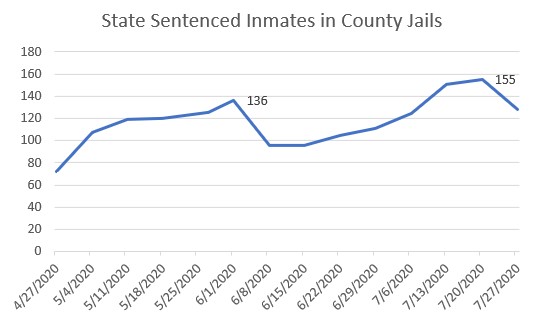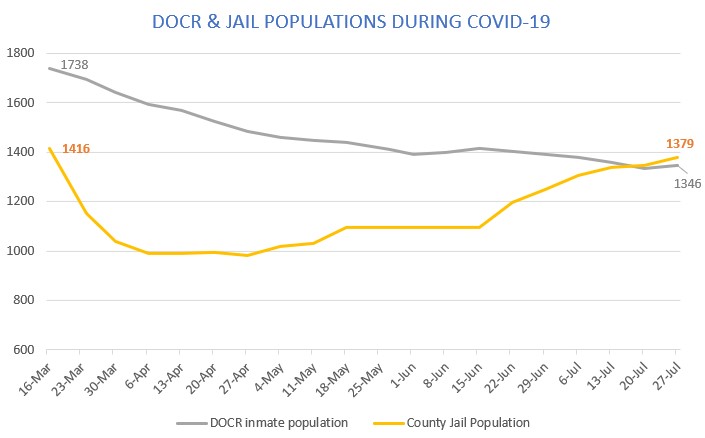State Inmate Policy Impacting County Jails
North Dakota county jails have played a key role in assisting the ND Department of Corrections and Rehabilitation with their efforts to mitigate the impact of COVID-19 in DOCR facilities. On March 13th, ND DOCR suspended the admission of state-sentenced inmates into their facilities. This has resulted in county facilities holding state-sentenced inmates for going on five months. While NDACo and our counties commend the work by DOCR to protect the inmates and employees in their facilities, their COVID-19 response plan has put local jail facilities in a real pinch.
ND Counties have housed 293 state sentenced inmates due to the restriction on admissions to DOCR. As of July 20th, 155 state-sentenced inmates remain in local jails. At the daily contract rate of $75, the cost to house these inmates since March has exceeded $1 million. The Emergency Commission and Budget Section have approved the use of CARES funds for DOCR to reimburse the local facilities for costs associated with holding inmates sentenced to the legal and physical custody of DOCR. The reimbursement, which counties requested, is much appreciated; however, the greater concern is the impact on space availability at local facilities.
Counties were forced to house state-sentenced inmates while continuing to book new arrestees. This occurred at a time when jails also needed space to follow appropriate COVID-19 health protocols to best protect the health and well-being of inmates, officers and staff. County jails have individuals booking in and out of their facilities daily. It is not an option for jails to close the door.
Several of the local facilities have incurred costs to modify their facilities to allow for greater separation of inmates, including areas to quarantine new arrestees. They are examining what other structural and HVAC system changes should be made to allow for greater health safety.
DOCR, for the past two months, has been working with county facilities on scheduling transfers of state-sentenced inmates to DOCR. Counties are required to test inmates scheduled for transfer five days prior and quarantine them. Counties appreciate that DOCR is coordinating and conducting the transports. Still, the number of state-sentenced inmates in county facilities was at its highest level in July. DOCR is working to create additional space to increase the number of new arrivals they can accept. Their goal was to accept thirty additional inmates by the end of July – providing some relief to facilities that are experiencing the tightest pinch for space.
As courts resume, DOCR created a policy prohibiting inmates transported to a hearing or trial from being returned to DOCR without being quarantined first. This policy will put an even greater burden on the local jails and could have implications on the district court and court process for inmates with pending cases.
Over the past year, DOCR has depended on the county jails for relief to their space and operational budget issues - whether due to the recent situation of DOCR closing admissions and forcing state-sentenced inmates to remain in county jails until space is realized - or the DOCR prioritization plan. The prioritization plan, authorized by the 2017 Legislature, allows DOCR to manage the prison population by denying the admission of state-sentenced inmates to state facilities if DOCR has reached their “operational capacity.”
The prioritization plan was in effect for female inmates from June 1 through September 30, 2019. During that time, DOCR denied admissions to 79 inmates in 18 counties. The costs of the prioritization plan in 2019 is estimated at over $65,000. Unlike the COVID-19 related costs, the housing and medical costs of housing state-sentenced inmates under the prioritization plan is the responsibility of the county taxpayers. NDACo along with the ND Sheriffs & Deputies Association have passed a resolution to seek legislative changes and the funding necessary to provide state funding when the prioritization plan is in effect.
As North Dakota lawmakers continue to study DOCR facilities and their future needs, this interim and plan for proposed legislation for the 2021 Legislative Session, these studies are important in understanding the pinch county jail facilities are experiencing, the heavy burden on our local taxpayers to provide jail services and the actions that are necessary in order to avoid continued shift of expense from the state to the county level.

